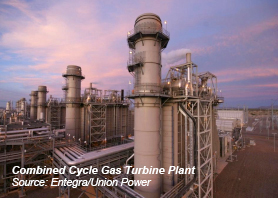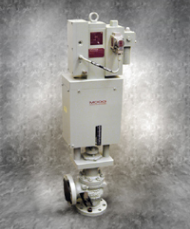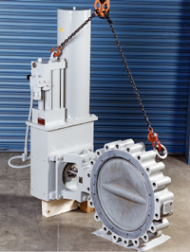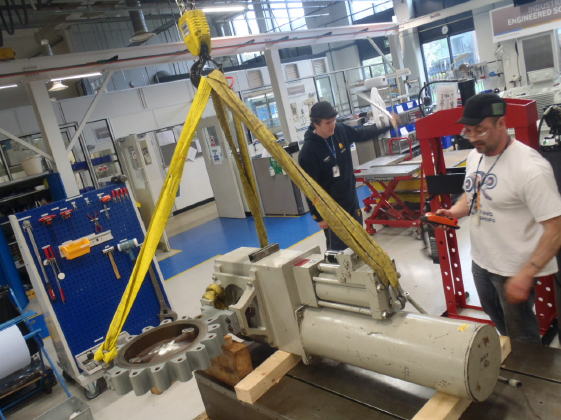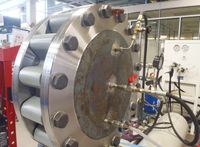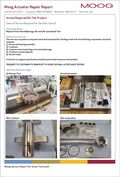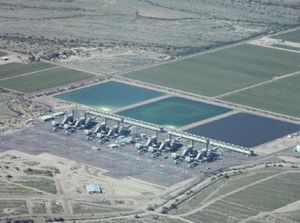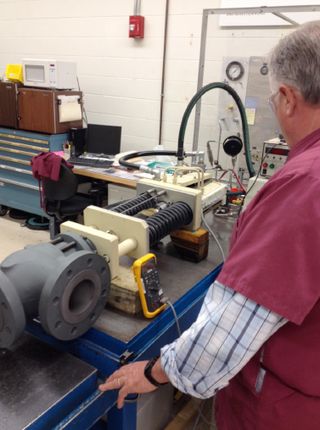In this article:
- Combined Cycle Gas Turbine Plants seek "as-new" performance of actuators and servo valves when making updates and repairs
- Motion control plays a key role in ensuring consistent power output and efficient operations
- The right repair services are critical in ensuring uptime of turbines during parts replacement
Many of the world’s most efficient power plants are now Combined Cycle Gas Turbine Plants (CCGT) incorporating both gas and steam turbines. Gas and steam turbines represent particularly demanding motion control applications because motion control is the key to machine performance, safety and ultimately the ability to supply power to households around the world. The application uses rugged inlet guide vane actuators and fuel gas control valves to provide the correct ratio of air and fuel in varying loads and ambient environments to ensure optimum efficiencies and minimize emissions. From a safety perspective, preventing leakage is also critical to reduce risk of fire and lower insurance costs.
In many countries, there are energy shortages so power plants must run around the clock and any downtime can affect the comfort of the population—and potentially the country's economy, too. In some places, old power stations, especially coal-fired plants are being shut down so it is vital to keep those plants that are energy efficient operating at maximum output. In today’s environment, downtime of even a single plant can put a stress on the existing electricity network. In addition, if the power plants exceed or underperform the output that has been declared, it could be subject to a fine from the authorities. Consequently, all power plants are concerned with maximizing uptime for greater energy output and looking for ways to keep the turbines running reliably at peak performance.
Why is motion control so important in Combined Cycle Gas Turbine Plants?
In the turbine system, the fuel gas control valve on the actuator is the predominant interface between a very complex control system and the mechanical portion of the plant. From a safety perspective, it is vital to ensure a rapid closing time for the main valve actuator in the case of an emergency shutdown to avoid potentially destroying the turbine. If there is an excess of steam or fuel in the inlet, this also compromises the turbine and causes severe damage in the power plant.
The motion control system affects the following:
- The power output of the turbine and thus the revenue stream
- Energy efficiency that equates to profitability as 80% of the cost of running these plants is fuel
- Level of emissions which is both a cost and compliance issue as improperly calibrated equipment could cause a plant to exceed its emission allowance
- Uptime and consistent power output which prevent penalties for unstable energy production levels.
Keeping critical systems operating
Moog provides actuators and servo valves to most OEMs of gas and steam turbine equipment including working with the designers of new turbines to develop the specifications and even the performance expectations of the equipment. Moog fuel metering actuators and fuel gas control servo valves are known for rapid closing times, leading-edge failsafe functioning and the highest dynamics. In addition, all hardware can be precisely adjusted according to the load required from the network to ensure efficiency. In many ways the most critical operations of the plant will benefit from the performance of the Moog actuator and valve – including conserving fuel, preventing pollution and providing the declared power output.
The challenge for power plants is keeping their critical motion control systems operating at the same high level as the original equipment in spite of 24/7 operations in rugged environments. In addition, to Moog Global Support repair and maintenance services, Moog offers special services to help power plants minimize downtime and ensure optimized performance. From expedited services for downtime to preventative maintenance programs for planned outages to special retrofit kits and exchange programs, there are numerous options to keep plants running efficiently and to maximize output.
The specialized Moog Power Generation Actuator Service is a complete evaluation, repair and testing service that can be offered in local country service centers and as field service. This is a more comprehensive service package than just a repair. As the original equipment supplier, Moog knows the motion control requirements of the application and has worked with the turbine OEMs to design a product that can withstand 30,000 cycles per year. These cycles result in a million micro motions of the actuator which can represent increased wear over time. In addition, Moog Global Support Servo Valve Repairs include several repair levels for fuel gas control valves from an initial evaluation test to a high level repair which could include a full strip down, ultrasonic cleaning, replacement or repair of a torque motor and replacement of the bushing and spool assembly. As with the actuator repairs, Moog technicians have the expertise to ensure quality repair using original parts and Moog has global facilities for quick turnarounds.
From the availability of product specifications and original drawings to service technician training (often at the turbine OEM in Japan or other countries), Moog has invested in ensuring the valve and actuator will perform as “as-new” or better. Achieving the “better” standard is accomplished by incorporating product upgrades when possible in the repair service including a proprietary surface finishing on rods and seals on some actuator models for improved longevity.
Moog technicians positioning actuator for disassembly
Below are two case studies of CCGT power plants in the United Kingdom and United States that worked with Moog to obtain “as-new” or better motion control performance on turbines while avoiding expensive downtime.
Case Study: Great Yarmouth Power Station
Background
Great Yarmouth Power Station is a Combined Cycle Gas Turbine (CCGT) owned and operated by RWE Npower Plc located on the United Kingdom's east coast. In 2012, the station started experiencing problems with a major low-pressure steam control valve, controlled by a servo actuator originally made by Moog in the USA. The control valve was making a lot of noise, with the bearings being the prime suspects.
The engineers at the power station made an enquiry to Moog about replacement bearings. Moog engineers suspected that the symptoms potentially pointed to something more than just the bearing and sought to ensure “as-new” performance due to the critical nature of this application.
The challenge
The customer provided details about the actuator to the service technicians at Moog’s Tewkesbury (UK) office. Moog sent an extract of a report describing the full extent of a Moog service. The depth of information supplied in the report, including value-added audio visual content encouraged engineers at the power station to opt for Moog's service offering.
Refurbished Process Valve
under test
Moog Service Report
for Great Yarmouth
It turns out that the "on-receipt" test confirmed the worst fears of Moog’s engineers: it was more than just the bearings at fault. In fact, the list was longer than initially thought and replacement parts included the piston and bearing assembly, the crank-arm, bushes/bearings, connecting pins, and all of the soft seals.
Moog confirmed that it was substantial wear to all of these components that was causing the noise and that there was also substantial leakage of hydraulic fluid. The actuator on-receipt performance testing was subsequently videoed by Moog and submitted to the customer along with a revised cost and repair schedule. Despite this ongoing repair work, the plant needed to continue operations.
The Moog solution
Moog offered a special expedited Actuator Service from its facility at Tewkesbury that included a full on-receipt test, a complete strip-down investigation, a review of all parts, replacement of the faulty parts, a rebuild to its original specification and test to ensure the original Moog specification.
Providing this special service also had some challenges. Not only did Moog engineers in Tewkesbury need original parts shipped in from the USA, but they also had to match the service window with planned downtime at the power station. Fortunately, Moog’s global network ensured they could get spares shipped overnight. The engineers then reassembled the actuator with new parts and tested it to its original specification – confirming that all faults had been rectified.
From order confirmation on the 8th of November, the repair took just ten days, with the unit leaving Tewkesbury on the 18th of November.
The result
During the outage, Matt Keen, Moog Systems and Projects Manager, visited the power station to review the installed equipment, and was able to highlight other service issues. So impressed were the engineers at the power station that they have since asked Moog to undertake additional proactive maintenance on another actuator and the associated process valve.
Case Study: Union Power
Entegra/Union Power Power Station
Source: Entegra/Union Power
Background
The Entegra/Union Power Station in El Dorado, Arkansas is one of the largest combined cycle power plants in the USA. The station is comprised of eight (8) GE Combustion Turbines (CT) and four (4) GE Steam Turbines (ST). This equipment is organized into “power blocks” consisting of (2) CTs and (1) ST, with each block generating 550 MW of electricity. Total plant output is 2.2 GW. The plant went on-line in 2003 and normally operates in cyclic/peaking modes which have a different maintenance schedule than a continuous mode.
The challenge
In 2012, Union Power began planning for upcoming inspections. They had 21 days allowed per Combustion Turbine and 18 days per Steam Turbine. The fuel gas and steam control valve assemblies needed to be refurbished during these outages. Extended outages required to refurbish this equipment may not occur again for another several years. To maintain reliability, the equipment had to be returned to “as new” condition, so a “quick fix” to meet the schedule was not an acceptable solution. The plant needed to be confident of the long term service life from the repair.
Union Power wanted OEM repairs and upgrades, but the timeframe to perform the repairs within the allowed inspection window left no margin for error. If this 550 MW block of power is off-line for a single day it could result in significant lost revenues.
The Moog solution
Union Power approached Moog's local distributor, AirDraulics, to determine the best solution. All outage planning begins with a complete site audit checking model and serial numbers for all Moog equipment to determine the physical layout, hazardous area ratings and actuator/process valve geometries. The audit confirmed that the fuel gas systems on all (8) CT were identical and half of the CT units were also equipped with Moog Inlet Guide Vane Actuators (IGV). The steam valve configurations differed as two blocks had 24” valves and the other two had 18” valves.
Moog Gas Turbine Actuator being tested
after overhaul
With this information Moog service technicians then proposed a service plan that included a combination of spares, repairs and exchange units to meet the customer's allowed inspection schedules. In addition, Moog has actually improved several components within the GE fuel gas actuators to extend outage cycles and require less frequent repair. When Moog repairs these units, these improved components replace the originals with extended life upgrades including proprietary surface coating on rods and varnish resistant seal designs, making the equipment “better than new.”
For the CT units, Union Power purchased one spare set of actuators. These served dual roles as both as a rotable set during planned outages and as emergency spares during forced outages. For each block, Moog utilized Union Power’s own spares and a set of its own exchange units complete with process valves. At the end of the preventative maintenance outage Moog would rebuild both sets, returning Union Power’s spare set to the site and replacing the Moog set in the exchange pool inventory. Moog administers the repair of the process valves through our Emerson distributor, NorthEast Controls.
It was determined that the steam turbines actuators and valves could be repaired within the allotted time. Union Power coordinated the repair and removed the steam process valves from the actuators. The actuators were sent to Moog for repair. Once the actuator repairs were complete, they received a final acceptance test, and were sent to site. Union Power reassembled the valve to the actuator, installed the assembly and tested it as part of the commissioning process.
Moog offers a two year warranty on actuator repairs and exchanges. This is the same warranty offered on a brand-new unit.
The result
To date, Union Power has completed outages on three of the four blocks. All outages were performed according to the schedule and all units were commissioned without incident. The final block is scheduled for its outage in fall 2014. Once completed, all of Union Power’s fuel gas valves will have the extended life upgrades and a renewed two year warranty.
Jim Howell, Sales Manager for AirDraulics commented on the project: "Moog has been a great partner through this process. They proposed an approach that met our customers’ needs and were even able to accommodate some last minute adjustments. Moog's OEM expertise on the motion control components and the fuel gas system in general were key to a successful outcome."
Conclusion
Working with OEMs on the original gas and steam turbines has given Moog engineers expertise in the application that enabled them to develop vital solutions for the life of the power plant. Combine this with a global repair network and proactive service teams and it's easy to see how motion control plays such a key role in keeping the lights on for people around the world.
Bios
Brian Sims is the services manager for Moog Industrial Group Tewkesbury, a division of Moog Inc. He has nearly 37 years of experience in engineering and aftermarket support across all markets including equipment used in oil and gas, industrial and power generation industries. Sims started his career with the Dowty Group originally working for Dowty Meco, a manufacturer of heavy duty mining conveyor systems.
Steve Beddick is the aftermarket sales manager for Moog Industrial Group, a division of Moog Inc. He has nearly 30 years of experience in engineering and aftermarket support for rotating equipment used in oil and gas, industrial and power generation industries. Beddick holds a bachelor’s degree in electrical engineering from Grove City College.


